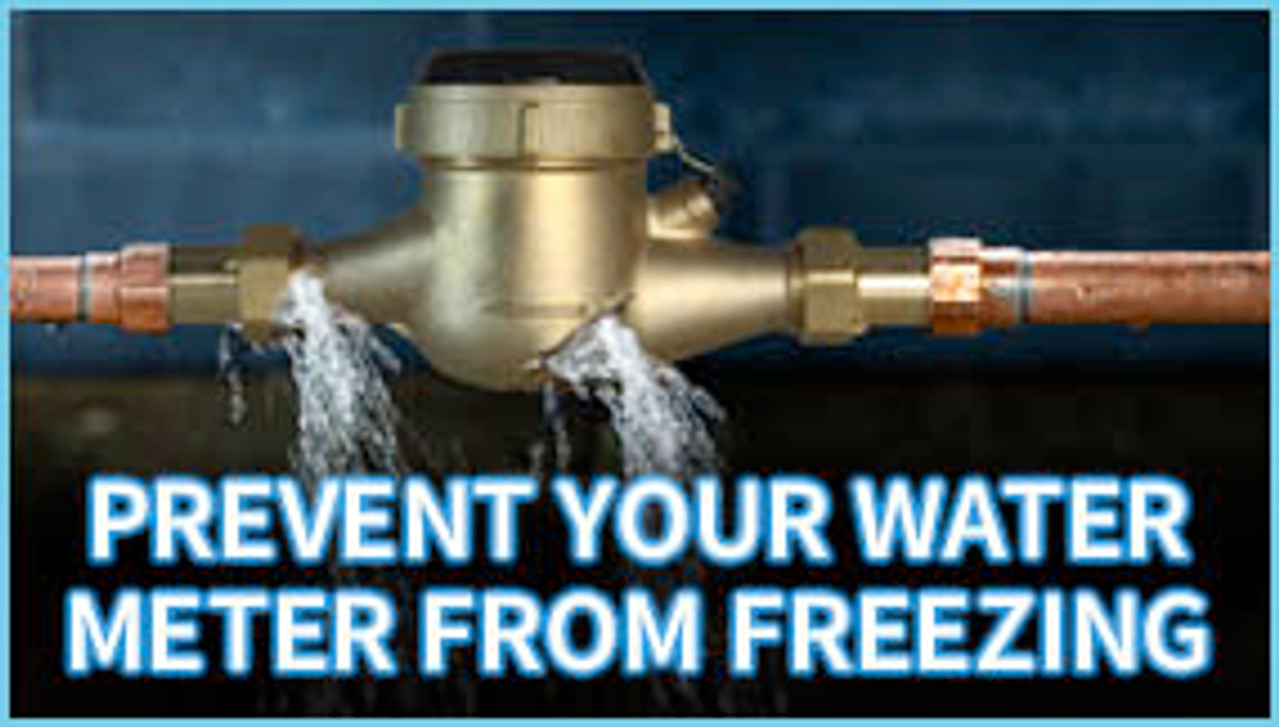Many people live in areas where the temperature outside can drop below freezing. In these instances, how can you prevent your water meter form freezing?

First, let’s discuss why it’s important to protect a water meter from cold temperatures. Frozen water expands and can lead to cracks in the meter or internal damage that will affect the function and accuracy. Repairing the damage from frozen water meters and burst pipes can be very costly. As with many problems, prevention involves just a few simple steps that are inexpensive and can save a lot of time and money. As they say, “An ounce of prevention is worth a pound of cure.” Your meter may be at risk of freezing if the temperature outside is below freezing for more than a few hours and the location of your meter is exposed to this cold air.
Reasons to Avoid Letting Your Water Meter to Freeze:
1) For homeowners, your water meter is owned by the the water company, however, it is the responsibility of the homeowner to keep the meters and pipes in good shape. If a pipe or meter freezes and requires repair or replacement, it will be up to the homeowner to cover that cost.
2) If your water meter or pipes break, the water will then leak through the cracks which could potentially cause A LOT of damage to the property and its contents. Along with that, you could incur an extremely high water bill.
3) Additionally, frozen or broken meters or pipes can result in your property not having water until they are repaired. So you want to do everything you can to keep your meter from freezing.
As you can see, allowing a meter to freeze can cause a lot of problems. Problems that could be easily avoided by taking the proper precautions. When in doubt, it’s better to be safe than sorry.
How to Prevent Your Meter from Freezing:
1) To the best of your ability, eliminate the cold air that comes in contact with your meter. If it’s located in a basement that is unheated or minimally heated, make sure your doors and windows are properly sealed to keep cold air out.
2) Run your faucets occasionally or let a slow drip run constantly during extreme cold. This keeps water flowing and greatly reduces the chances of pipes and meters freezing. This solution is only applicable for situations where the extreme cold is VERY RARE. You wouldn’t want to have to do this frequently. All it takes is to forget one time and the damage is done.
3) If your home or properties will be left vacant for an extended period when the weather is cold (I’m talking to all you snowbirds!!), There are 2 methods that will work:
a. Never completely shut your heat completely off. You can set the thermostat as low as 40˚ and that will be sufficient to prevent freezing (assuming the thermostat and meter are in a common area). This is best for climates where the temperature rarely drops below 35˚ or when you may occasionally visit, therefore you never drain the water lines.
b. If you are gone for the entire time and you typically drain the water lines and/or fill them with an antifreeze, you should also remove the meter and replace it with a spacer tube. DO NOT do this on city owned meters which will have tamper proof wires on them that prevent you from doing so. Check with the local authorities for information on how to handle this. You may need to install a bleed valve between where the water line enters and the meter.
4) Use foam insulation on your pipes and meter jackets on your meter(s) to insulate them from the cold. Flows.com carries a simple meter jacket made from nylon and filled with artificial stuffing. There is also a molded Styrofoam insulator available for the Neptune T10 water meters. This jacket and insulator are meant to protect the meter for short periods of time in below freezing temps.
5) Wrap heat tape around your pipes and meter. This tape has a flexible heating element, similar to a wire, that is wrapped around or attached to the pipes to provide just enough heat to keep the pipes above freezing. This tape, however, does require electric power, so in the case of a power outage, your meter will be vulnerable to freezing.

